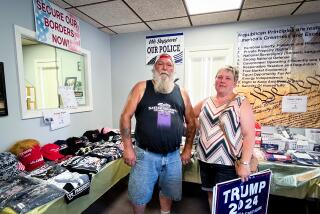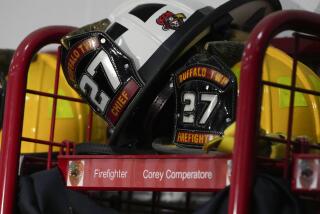War wears on small town’s spirit
HOLLIDAYSBURG, PA. — It is too soon to erect a war memorial for three sons of this hill-country town killed in combat in Iraq. The war has taken a heavy toll, and few residents need a reminder -- either of their loss or of the Iraq conflict’s role in the fall elections.
Brian Baum carries his own private memorial on his right shoulder. He only has to lift his sleeve to bare a tattoo honoring his brother Ronnie, a Marine gunnery sergeant killed by a rocket fired by Iraqi insurgents near Fallouja on May 3, 2004.
“KIA AL ANBAR PROVINCE,” reads the green scrawl, a permanent mark of Ronald Baum’s initials and the time and date of his death. “R.E.B. 1458 040503.”
On Nov. 7, Brian Baum expects to vote Republican, just as a solid majority of the town’s 5,300 residents has done for decades, mirroring the reliably conservative electoral habits of a region that has long been attuned to the GOP’s foreign and domestic agendas.
But despite their own support for President Bush and Pennsylvania’s Republican candidates, Baum and other family and friends of Hollidaysburg’s Iraq casualties have watched uneasily as local backing for the war has ebbed recently.
Gossip spreads fast here, and so have rumblings against the war. The doubters remain a minority, but the gloomy news from Iraq and reports of disarray among political and military leaders is weakening a once-dependable rural GOP buffer against Democratic voting bases in Philadelphia and Pittsburgh.
“Nobody comes up and tells me directly. They know how I’d react,” said Baum, who also served as a Marine sergeant in Iraq and was stationed there when his brother was killed. “But you hear it from the kids in the schools, and you pick it up in conversations when you go out. They’re getting tired of the war.”
Mayor Joseph Dodson, a lifelong Republican and former Army and Marine reservist, backed the Iraq invasion but now wonders whether the U.S. has stayed too long.
“We have to keep the country safe, but I think our military is stretched too thin,” Dodson said. “When President Bush landed on that aircraft carrier and said ‘Mission completed,’ I thought: ‘That’s it.’ Instead, we’re still there dealing with all these religious sects, trying to keep them from killing each other.”
Mood imperils senator
The rising pessimism about the war is not expected to threaten the region’s Republican congressmen. But pollsters and some Republican leaders say the doubts may depress enough GOP votes in the region to dash the reelection hopes of Sen. Rick Santorum, who faces a daunting challenge from Democratic state Treasurer Bob Casey Jr.
Santorum won handily in the central part of the state when he was reelected to the Senate in 2000, taking 65% of the region’s vote. But in September, the Keystone Poll and the Quinnipiac University poll each found that the incumbent was barely registering 50% against Casey in central Pennsylvania -- signs that public dissatisfaction on Iraq was leaching into the most loyal Republican ranks.
“It’s going to affect Santorum,” said Rep. Bill Shuster (R-Pa.), who lives in Hollidaysburg. “Voters who are turning against him are sending a clear message to President Bush about the war.”
Shuster, a war supporter, expects to win his own race next week but frets that the vote will be as much as eight points tighter because of rising concerns about the war.
Brian Baum is less concerned about Republican political fortunes than he is about fraying local support for the war. “We can’t pull out now -- we can’t leave,” said Baum, a muscular security director for a local factory. “If we pull out now, what does that mean for all the guys who died? It’s all for nothing?”
Two other Hollidaysburg men were killed in the Iraq war. Army Sgt. Brandon E. Adams, 22, was gravely wounded in February 2004 during a grenade attack in Fallouja. He died of his injuries at Walter Reed Medical Center in Washington the following September.
The town’s most recent casualty was Staff Sgt. Daniel R. Lightner Jr., 28, of the Pennsylvania Army National Guard, killed in October 2005 by a roadside bomb that struck his armored vehicle near Ramadi.
Their deaths would be a blip in a big city, but they linger as raw wounds in close-knit Hollidaysburg. Nearly every other car parked in the town’s prosperous main square carries a faded yellow ribbon in honor of U.S. troops. American flags droop over the porches of dozens of old clapboard houses.
Hollidaysburg is a faded railroad industry hub where a ghostly railcar plant, once one of the largest in the nation, lies abandoned on the town’s east side below a hilly expanse of oaks and maples. But the town has remained vibrant because of an influx of medical and service firms and its status as the county seat.
Those who lost loved ones in Iraq deal with the grim news in their own ways. Some relatives, like Carol and Sam Adams, the parents of Brandon Adams, and Ronald Baum’s wife, Cynthia, who was left with two young sons and a daughter, have retreated into silence.
“We don’t like to bring politics into our son’s death,” said Carol Adams.
Others cling more fiercely to their support for the war as a way to wrest meaning from their mutual tragedies.
Judy Lightner passes the days as melancholy curator to bookcases filled with military mementos from her son, Danny.
She sometimes wears his old camouflage khakis to keep his memory alive.
A former Pennsylvania state trooper, Daniel Lightner left behind a trove of medals and uniforms, and a letter that urged his mother “not to be sad, because I volunteered for this mission and I would do it again if I could.”
“He believed in the war, so I have to, too,” Judy Lightner said. “I have to think this way to get through.”
One war complaint
Brian Baum’s only complaint about the war is a strategic one: He faults the U.S. military for failing to move rapidly into the rebel stronghold of Fallouja. The extra months, he said, gave Iraqi insurgents “time to stock up their arms. My brother would be alive today if we had gone into Fallouja earlier.”
The brothers had deployed to Iraq within three weeks of each other in February 2004. Less than three months later, Ronnie, a member of the 2nd Marine Division, drove into an ambush outside Fallouja. Rising from the turret of an armored personnel carrier, he was struck down by a rocket.
Brian Baum was just 30 miles away at the time, disarming a roadside bomb near the U.S. airbase at Al-Asad.
He escorted the coffin home on a C-130 transport. In his pocket was his brother’s crumpled metal dog tag.
Ronnie was buried at Blue Knob Cemetery in a ceremony attended by Marine honor guards and hundreds of mourners, many of them strangers drawn by the urge to honor a local boy.
“Until we went in the Marines, neither of us amounted to anything,” Brian Baum said. “But they had 75 Marines there, 1,000 people. You think you can’t touch anyone in your life, but the response for Ronnie proved that wrong. That’s what we’re trying to do in Iraq. It’s still worth it.”
*
More to Read
Get the L.A. Times Politics newsletter
Deeply reported insights into legislation, politics and policy from Sacramento, Washington and beyond. In your inbox three times per week.
You may occasionally receive promotional content from the Los Angeles Times.










